The 6th ICP Forum was successfully held on 16 November 2024 in Guangzhou City. The meeting attracted more than 100 related professionals to learn on-site.
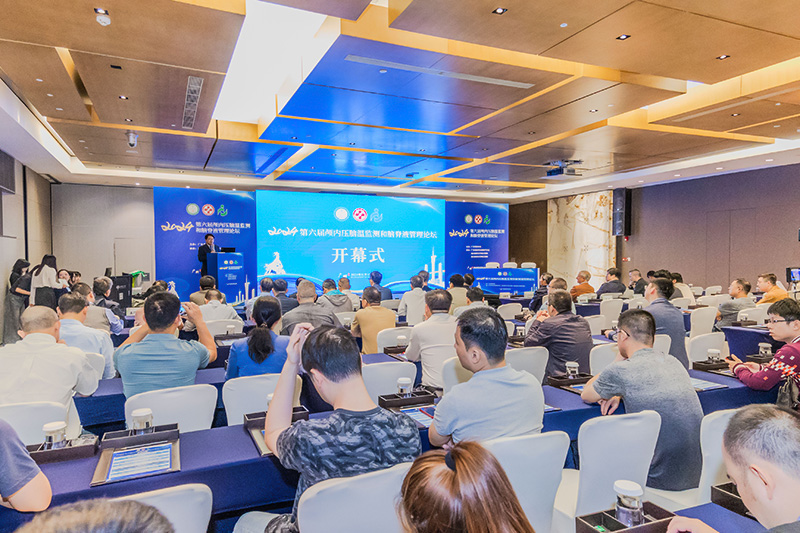
The opening ceremony was hosted by Prof. Qiu Binghui from Nanfang Hospital. Prof. Qi Songtao from Nanfang Hospital and Prof. Jiang Jiyao of Renji Hospital delivered opening speeches, they expressed that intracranial pressure/brain temperature monitoring and cerebrospinal fluid management are the basic skills and methods in neurosurgery, and they hoped that the conference could further promote the standardization of intracranial pressure brain temperature monitoring and cerebrospinal fluid management.
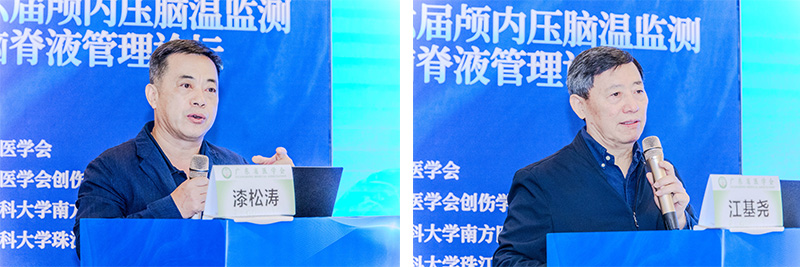
The academic content of this conference was compact and rich. The theme of the morning was Intracranial Pressure and Brain Temperature Monitoring. The first session, International Masters' Lecture, was co-chaired by Prof. Feng Junfeng from Renji Hospital, Prof. Wu Xuehai from Huashan Hospital, and Prof. Qiu Binghui from Nanfang Hospital. Professor Andrew Maas from Antwerp University Hospital, shared the lecture on ‘Neuromonitoring: ICP and Brain Temperature’, explaining that the interpretation of ICP monitoring information should not be limited to numerical values; that high brain temperature has an adverse effect on brain function, and that personalized and precise medical treatment is needed to manage ICU patients. Professor Nicolas Engrand from the Rothschild Foundation Hospital shared a lecture on ‘Should brain temperature be measured in brain-injured patients’, describing the physiological patterns of brain temperature on brain metabolism, brain temperature-core temperature correlation, and sharing his clinical experience on brain temperature monitoring. Professor Jiang Jiyao from Renji Hospital, shared the topic of ‘Chinese protocol for the management of cranial hypertension in acute traumatic brain injury’, which demonstrated the Chinese protocol for the management of cranial hypertension in different types of acute craniocerebral trauma with abundant cases.
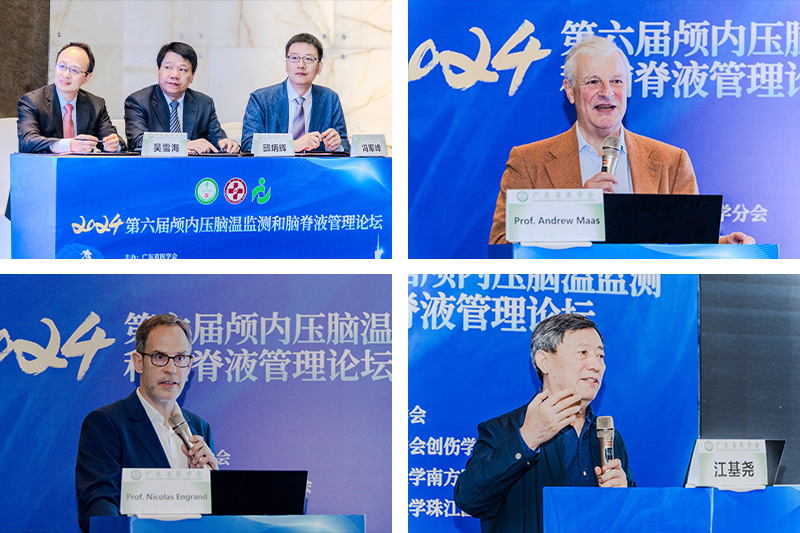
The second session of China's ICP and Brain Temperature Monitoring Frontier Exchange Topics was co-chaired by Prof Wang Qinghua from Zhujiang Hospital, Prof Feng Guang from Henan Provincial People's Hospital, and Prof Wang Guangyu from Affiliated Children's Hospital of Shandong University. Professor Gao Guoyi from Beijing Tiantan Hospital shared ‘Intracranial Temperature and Pressure: Correlation and Causal Effect’. Proposing to explore the correlation effect between brain temperature and intracranial pressure through multi-modal monitoring and analysis, and to formulate a precise and individualized management approach. Professor Wang Yuhai of No. 904 Hospital shared ‘Re-conceptualization of DC for TBI’, proposing to perform controlled decompression based on ICP titration to reduce postoperative complications and improve clinical outcomes. Professor Qiu Binghui from Nanfang Hospital shared ‘Timing of ICP/EVD in Critical aSAH’, sharing the experience of timing and probe selection for ICP monitoring in aSAH patients through case-saving examples, as well as the comprehensive consideration of combining with clinical medication.

The third section of the clinical practice experience sharing topic was co-chaired by Prof Ge Shunnan from Tangdu Hospital, Prof Liu Xiguang of the First People's Hospital of Lianyungang City, and Prof Huang Qianliang of Ganzhou People's Hospital. Professor Zhao Di from the Fourth Hospital of Hebei Medical University shared the ‘Practice and exploration of ICP/ICT monitoring and TTM in sTBI clinical application’, sharing the clinical treatment and critical care management concepts of craniocerebral trauma through a classic case of TTM performed under the guidance of intracranial pressure and brain temperature monitoring. Professor Wang Zhizhong from Hubei Third People's Hospital shared ‘Integrated Management and Control of BP-ICP-CPP in Critical Cerebral Hemorrhage’, demonstrating the comprehensive treatment plan for the management of intracranial pressure based on intracranial pressure monitoring in combination with cerebral blood flow management through 2 cases. Professor Du Hui from Zhujiang Hospital shared ‘Application of ICP Management and ICT Monitoring in Neurocritical Care’, which introduced the standardised management of a cranio-cerebral trauma patient's treatment under the guidance of the guideline, and showed the significance of intracranial pressure and cerebral temperature monitoring from early warning to guiding the treatment to the assessment of prognosis.
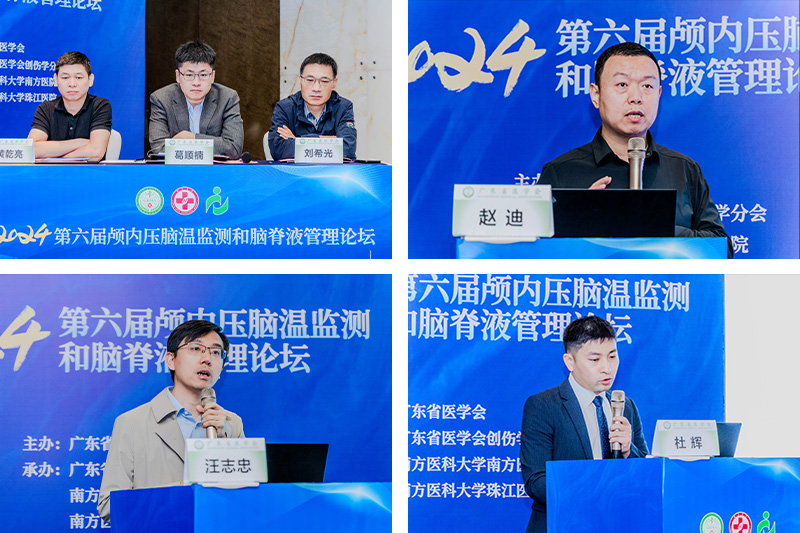
The afternoon academic exchange centred on the standardized management of cerebrospinal fluid:
The first session was hosted by Prof. Deng Yongbing from Chongqing Emergency Medical Centre and Prof. Huang Xianjian from Shenzhen Second People's Hospital. The first speaker was Dr Li Guozhu from Dongguan People's Hospital, whose topic was ‘L-P Shunt Case Sharing’. He shared that L-P Shunt has many advantages, including avoidance of ventricular puncture and its complications such as bleeding from the puncture tract, followed by low incidence of infection, easy operation and shortened operation time. The second speaker was Professor Xie Tao from Zhujiang Hospital, who presented ‘Secondary hydrocephalus and clinical management experience’. The most important factor influencing the outcome of secondary normal pressure hydrocephalus (sNPH) is early diagnosis and intervention, and a definitive diagnosis can only be made if the appropriate diagnostic criteria are met. The third speaker, Prof Wang Huanming from Wuhan Brain Hospital, presented the topic of ‘Diagnosis and treatment strategy of hydrocephalus after craniocerebral trauma’. He systematically and comprehensively explained the classification, diagnosis, treatment and complications of post-traumatic hydrocephalus (PTH), and shared his diagnosis and treatment process and experience with a case of hydrocephalus secondary to trauma.

The second session was moderated by Prof Bao Yun from Nanfang Hospital, Prof Jin Tao from Shantou Central Hospital, and Prof Zhuang Shunfu from Zhangzhou Hospital of Fujian Province. The fourth speaker was Prof Zhu Meng from the Affiliated Hospital of Qingdao University, presenting the topic ‘Experiences of diagnosis and treatment of shunt disorders after ventriculoperitoneal shunt surgery’. He shared about the complications related to post ventriculoperitoneal shunt, including surgery-related such as intracranial hemorrhage/pneumoperitoneum, intracranial infection, digestive tract injury, peritoneal effusion, abdominal infection, and digestive function abnormality. Shunt system related such as blockage/infection/fracture/exposure/displacement/insufficient length/adhesion and inadequate or excessive shunting due to improper valve pressure. He demonstrated the various management methods of post-shunt complications through several cases and standardized management through individualized analysis. The fifth speaker, Prof Wang Wei from the First Affiliated Hospital of China Medical University, gave us a presentation entitled ‘Cerebrospinal Fluid Management in Patients with Meningeal Metastatic Cancer’. Firstly, he introduced the implantation of OMMAYA reservoir for the treatment of patients with meningeal metastatic cancer. He emphasized the importance of surgical treatment, which is carried out simultaneously with three procedures: VP shunt, Ommaya reservoir implantation and port implantation, in order to reduce the patient's intracranial hypertension, and to save more time for the subsequent neurological chemotherapy, thus improving the patient's survival period. The sixth speaker, Professor Yao Longfei from Yichang Central People's Hospital, presented the topic of ‘Ommaya reservoir in neurosurgery treatment experience sharing’. He elaborated on the application of Ommaya reservoir in the surgical treatment of a variety of neurosurgical diseases, including cerebral hemorrhage, sTBI, brain tumor and intracranial infection. Compared with traditional extra ventricular drainage, Ommaya reservoir has significant advantages. It can adjust the timing of drainage according to the actual needs of the patient, allowing for more flexible drainage and longer tube placement.
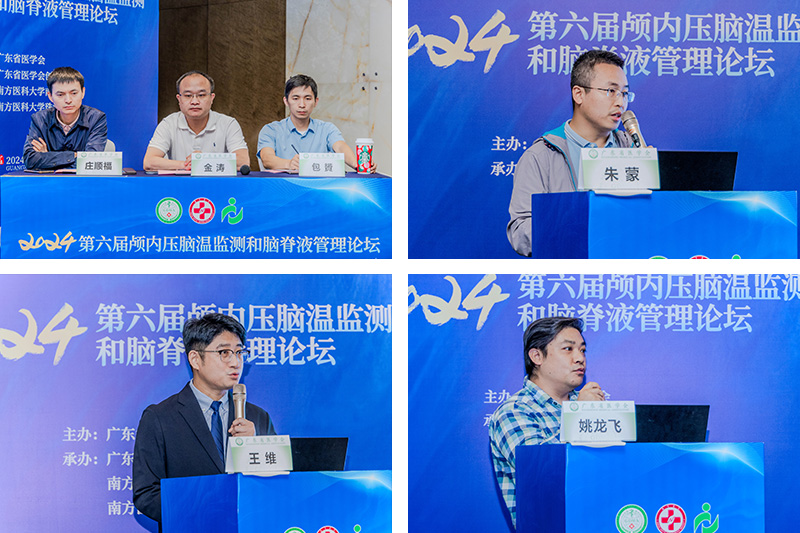
The content of this conference ranges from lectures by international masters, to sharing by domestic experts, to the discussion of frontline clinical practice experience, from the two dimensions of intracranial pressure and brain temperature monitoring and cerebrospinal fluid management, which provides an academic feast of in-depth exchanges for neurosurgeons and neurological intensivists in Guangdong Province and even in the whole country. In the warm atmosphere of learning and discussion, the conference came to a successful end.